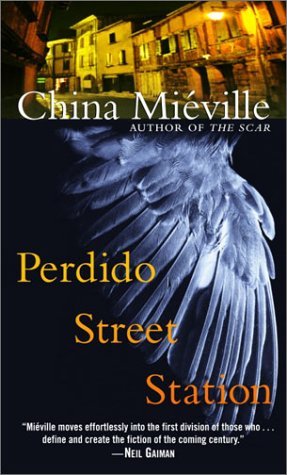 Perdido Street Station, China Miéville
Perdido Street Station, China Miéville
Originally reviewed 1st June, 2008
The description in this book is very good, in terms of the fact that it creates a very vivid picture. Of course, it also grossed me out, and maybe went a little bit overboard with that. Just two chapters in, though, I was ready to say that his world building was excellent. Sentence building? Maybe not so much. At one point I stopped and counted how many words were in one sentence, which took up half a page just by itself. One hundred and nineteen words without a single full stop! Although, admittedly, there was other punctuation — thankfully, or I’d have gotten even more lost in the sentence than I did. People can write stories in fewer words than that! I suppose you can make a case for it being a deliberate choice. The last three words of the sentence are, after all, apparently central to the book: Perdido Street Station.
One hundred pages in, I was very much intrigued by the world, by how things came to be that way, by whether there was any connection to our world, despite its strangeness, or whether it was just something entirely different. I wasn’t so hooked by the characters, about whom I knew little than the fact that one was a scientist obsessed with his work and the other was an artist, his somewhat illicit lover.
By one hundred and fifty pages in, I was getting tired of all the description of the city. And I still didn’t really care about the characters. I was intrigued by Mr. Motley, but only because I wanted to know what had happened to him, and I was curious about the garuda, but I didn’t really care. If anything, the main character in this book is the city itself, and the plot designed to take you on a tour of every corner of it. That’s interesting enough, but not really my thing. When the slake moths came in and the story became more focused on that, it began to be more interesting. The little glimpses into Yagherek’s mind and crimes made me somewhat more interested in him as a character, and the strangeness of the Weaver made it interesting too.
Jack Half-A-Prayer came out of nowhere. I can see foreshadowing for him coming in, but his presence wasn’t necessary to the plot — it was just another little detail about the city-character, really.
This book didn’t care about being ruthless to the characters. In some ways that’s good, but in actuality I didn’t care enough about the characters to be really hurt by the ruthlessness.
I wasn’t disappointed, per se, and I did find it an interesting, absorbing and, in places, exciting read. I just don’t quite know if all the raving I’ve been reading about it is entirely justified.
Note: I think I’ve now read just about everything by Miéville, and I think it is justified. But his books are weird.
Rating: 4/5

I found Perdido Street Station a very hypnotic read. China Mieville composes sentences like a musician – the language sings, and about half the words seem to be made up ones. I do remember how intimidating that thick brick of a novel seemed, especially with those massive sentences, but then I somehow got absorbed.
I also loved The Scar, but The Iron Council left me quite cold. His books can be a bit hit and miss: Un Lun Dun was atrocious (trying to create word-music by putting in lots of adverbs was a terrible idea, and his virtuoso writing style simply does not lend itself to YA genre), The Railsea was ok, The City and The City was great, but Kraken was not.
His way of prose composition though is genius. At the risk of antagonizing and English Lit student, I believe his works will one day be equalled to Shakespeare’s.
Yes, I felt the same way, except I liked Un Lun Dun! And yeah, Kraken just… what?
It’s impossible to say. I think because he doesn’t have the popularity now with a broad swathe of the population, he’s unlikely to be memorialised in quite the same way. But the quality, maybe.
Good review, and the comments underline what a divider Meiville can be. I liked PSS, it was my first of his, but with qualifiers. I’ve just started Iron Council (three years later) and I’m really enjoying it.
I remember reading this — I wrote the review as I went along, because there was so much to talk about! Glad it’s still worth reading. I wasn’t a big fan of Iron Council, but I don’t recall why… my old review of that will probably come up some Friday soon, heh.